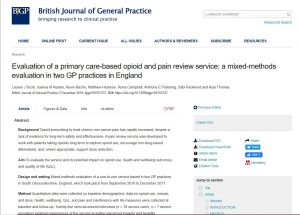Evaluating the South Gloucestershire opioid painkillers addiction pilot
GP prescriptions of opioid painkillers for people with chronic pain that isn’t related to cancer have increased by 60 per cent in the last decade. Common opioid painkillers include morphine, tramadol, codeine and fentanyl. Chronic pain is categorised as pain that lasts longer than three months.
There’s a lack of evidence that opioid painkillers are effective in treating chronic pain and people may become dependent on these painkillers. Additionally, the number of deaths from overdose has risen in the UK.
Guidance recommends improving support available in primary care settings for patients taking prescription opioid painkillers for chronic pain to manage their pain more effectively and reduce opioid painkiller dependence.
The ‘South Gloucestershire opioid and pain review service’
The South Gloucestershire opioid and pain review service was a two year pilot service aimed at supporting long-term users of opioid painkillers manage their pain in a GP setting and where possible, reduce their opioid use. Adult patients prescribed opioids for at least three months and receiving at least three prescriptions in that period were eligible to use the service.
Dedicated project workers provided each patient with an individually tailored pain-management plan which included setting daily goals, developing a relaxation strategy, introducing exercise and improving sleep. A review of the types and amounts of opioid that the patient was taking was conducted, and support provided, if appropriate, to help them reduce their dose.
Project aims
The CLAHRC West (now recommissioned as ARC West) project aimed to evaluate the service and its potential impact on opioid use, health and well-being outcomes, and quality of life.
What we did
We collected data on the types of people using the service. Details about each patient’s opioid dose; measures of health, wellbeing, quality of life, and pain; and information on how the use of painkillers affected their life were collected at the beginning and during follow-up.
Interviews with 18 service users and seven service providers explored their experiences of the service, including what they saw as its impacts and benefits.
What we found and what this means
Our analysis showed that 35 per cent of patients who used the service reduced their opioid dose while a further nine per cent stopped taking opioids altogether. On average, service users improved on all health, well-being and quality of life outcome scales. There was no change in their pain relief scores.
The interviews revealed that both patients and service providers found it acceptable to focus on the psychological issues underlying chronic non-cancer related pain. Patients welcomed having time to discuss their pain, its management and related psychological issues. They also wanted a long-term approach as chronic pain is a complex issue which takes time to address. They felt benefits of the service included improved wellbeing such as greater confidence and self-esteem, being able to use pain management strategies, changes in their use of medication and reductions in their dose.
Our evaluation suggests that it is possible for patients with chronic non-cancer pain on long-term opioids to be managed in GP practices. It highlighted the importance of the project worker, and the value of running a flexible, individually tailored service.
What next?
We evaluated a small group of patients, so larger studies are required to be sure of the effects.
Our findings can be used to inform the development of similar services in the future. A randomised controlled trial and economic evaluation is needed to formally test their effectiveness.
Paper

Evaluation of a primary care-based opioid and pain review service: a mixed-methods evaluation in two GP practices in England
Read the paperLinks and downloads
- Evaluation of a primary care-based opioid and pain review service: a mixed-methods evaluation in two GP practices in England Read the evaluation of a primary care-based opioid and pain review service paper
- Acceptability of a primary care-based opioid and pain review service: a mixed-methods evaluation in England Read the acceptability of a primary care-based opioid and pain review service paper
Lead collaborators
- Dr Kyla Thomas, South Gloucestershire Council

